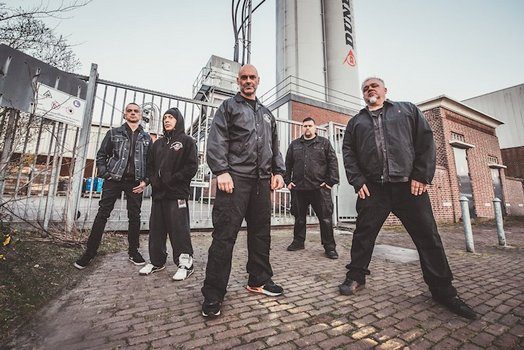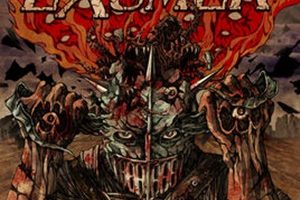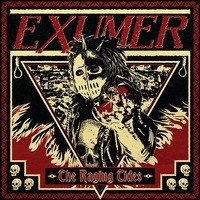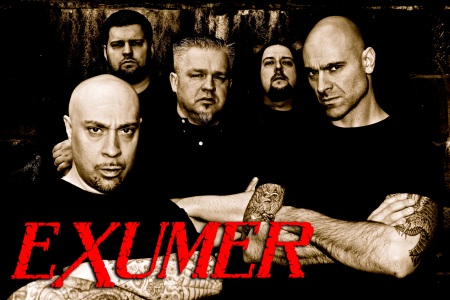Exumer – Unleash the Hostility
Thursday, 18th April 2019
Ardent followers of the thrash scene probably remember this German act, on the cusp of the Sodom, Destruction, and Kreator roots that elevated the Teutonic style to the world. Their debut album Possessed by Fire came out in 1986, and that along with the follow-up Rising from the Sea made solid inroads in the burgeoning independent label ranks. The band would part ways by the early 90’s – resurrecting fully by 2008 as a two-continent band (bassist Tony Schiavo and vocalist Mem Von Stein living in the United States, while guitarists Ray Mensh and Marc Bräutigam plus drummer Matthias Kassner reside in Germany). Signing with Metal Blade, the band has enjoyed the fruits of a subsequent thrash resurgence, gaining a healthy following of the current and the old guard as they release new albums and tour in more areas than they ever could have imagined.
Their fifth-length Hostile Defiance contains a mixture of mid-tempo to slightly faster thrash tracks – blistering the landscape with ripping hooks and pit-worthy transitions that have as much in common with the early Bay Area brigade (Exodus, Slayer, Legacy/Testament) as they will with the German brigade. Feeling the need to penetrate the brain of vocalist Mem Von Stein, he was happy to let loose about everything from where he sees this album in the catalog of Exumer, the numerous mental illness/health topics covered on the record, plus discussion about the old/new models of the music industry, and the pendulum leadership model shift from a global perspective.
Dead Rhetoric: Hostile Defiance is the latest Exumer album – and you mention in the background information the balance between incorporating an up to date and relevant sound in a well-established genre like thrash. Where do you see the major differences as far as approach, sound, and execution this time around compared to previous Exumer records?
Mem Von Stein: All three latest records we worked with the production team of Waldemar Sorychta and Dennis Koehne, and this time around Waldemar couldn’t make it because of scheduling issues. We wanted to keep Dennis on board so what that meant was that since he engineered two of the records and recorded the drums for the last three, never having done the production before we had to be more prepared than before. We didn’t know how it was going to flow in terms of production, so we came into this record really well-prepared with the songs. A strong focus on being as well-prepared as possible, and that’s basically what we did. We started writing for this record in the summer of 2017, looking for riffs and things. The writing process concluded in the fall of 2018, so it was a year and a half working on the record before we entered the studio.
That’s the biggest difference in terms of how we approached the album. What we try to do with each record is try to build upon the strengths of the previous record. That’s what we did this time around – we noticed some of the mid-tempo tracks from The Raging Tides worked really well live with the fans and they enjoyed them, we took that element into the songwriting process of the new one. We wanted to expand the sound a little bit, and we decided to infuse a little more melody. With the riffs, the guitars, the solos, and my vocals – and those are the major differences in this one and all the other records, even the previous ones we released during the 1980’s.
Dead Rhetoric: What fuels the lyrical content for this record– do you look to current events and social/political unrest, or are there specific experiences and outlooks that you felt the need to express?
Von Stein: Each record I write an overall topic and theme. Fire & Damnation was our comeback record, it had a lot of reflection of what we went through when we stopped Exumer in the 80’s/early 90’s and going into the 2000’s and current events. The Raging Tides was a highly political record, I wrote about the rise of Isis, Trump’s election, all these things coming together. I thought there was a lot of stuff I read on Amnesty International about torture around the world. Hostile Defiance is a little closer to me in terms of topics – the topic of mental illness. The shootings that we have had since Sandy Hook, that seem to be occurring on a fairly regular basis around the country. I have been working in the field of psychiatry since 2002 and every time somebody goes and shoots about 50 people, the first thing that people turn to is, they must be emotionally unstable, and they haven’t been treated. It throws people who suffer from mental illness into this shade, maybe not in an unconscious way, but it has a bad connotation to it. I just wanted to write about the topic, keep the dialogue going, and remove the stigma of it with my little contribution that I can.
Obviously if you go and shoot 50 people you have emotional problems, you can’t contest that. Instead of looking to change gun laws in the country and make it harder to get weapons – in my twenty years of working within psychiatry, I’ve encountered maybe five people or ten people who were violent and the rest are just suffering from (mental health issues). I wanted to normalize the topic – each song is about one form of mental illness, symptoms. The protagonist is the guy in the mask, that guy goes through these emotions and feelings. “Hostile Defiance” is about oppositional defiance disorder, which occurs mostly with younger people in adolescence when they can’t handle their emotions and they have violent outbursts. “Rapture” is about depression, I’m talking to the person that is experiencing these symptoms.
Dead Rhetoric: Tell us a little bit about the cover art with Romanian artist Costin Chioreanu (Arch Enemy, Grave) – how did the idea develop, and can you discuss the importance of striking covers in the thrash genre (what have been some of your favorites of all-time)?
Von Stein: When we liked what Costin did with At the Gates and Voivod, we wanted him to do the artwork and the video clip. I talked to him via Skype, and I explained the lyrical concept behind the record. He was intrigued by it, we definitely had to have our mascot, the masked dude, featured on it. I sent him the lyrics, and explained the whole thing – I went a little more in depth in each song. He came up with a few ideas, and we arrived at the artwork pretty quickly. The masked dude, he’s in a straight-jacket and he has these eyes in his hands – a direct reference to the song called “Trapper”, and that was about schizophrenia. The guy is hallucinating, has night visuals and auditory hallucinations – the lyrics in the mid-section of the song talk about demon eyes, come follow me. He took that idea and put that on the cover.
Dead Rhetoric: Is it fair to say many of your vocal influences as far as phrasing, attitude, and delivery come from more of a Bay Area template – a la Exodus and Slayer – than typical Teutonic thrash vocalists? And how has your range and stamina progressed this deep into your career?
Von Stein: Yes. Put it this way – when we were growing up… our demo was recorded in 1985. At that point, Kreator had their first record out, and we are considered the second generation, but we are so close in time in terms of releasing records with everybody. We looked to the states for inspiration, and my vocal style was very much inspired by Paul Baloff of Exodus, and I’m a huge Slayer fan – the first three records are amazing. We were always looking towards the states, while I think a lot of stateside bands were impressed with what was going on in Germany with the scene.
In the past 34 years since then, everything has changed. My vocals have become a lot more powerful since the days of Possessed by Fire, when I was a lot more hectic, erratic to a point. That’s an 18-year old instead of a 50+ year old man.
Dead Rhetoric: Considering Exumer got its start in the 1980’s in the thriving German thrash marketplace, do you find that your audience consists of a mixture of these old-school maniacs and maybe their sons/daughters, proving the wide-ranging appeal of heavy metal?
Von Stein: Let me tell you something. The biggest surprise was when we got the band back together, Ray and I in 2008 and then started to tour in 2009. We did a short tour over in Europe and the states. We played five shows and they were all over the place. Wherever we went, we saw these much younger people than us knowing and loving our music. It came to us as a shock, especially when we hit Los Angeles in 2009. That’s the first time we played in the United States, we saw 1,300 people and I think the biggest seller in that venue was water because the majority of the people in that venue were under 21. It was a shock that so many people knew about our 80’s records, and at the time we didn’t have Fire & Damnation our first Metal Blade record that came out in 2012. We are used to it now – there’s something about metal and something about thrash I think it translates well into generations. It doesn’t become hokey for some reason, it holds up really well. Even the old songs that we play live, we play five songs from Possessed by Fire when we usually play live, and they sound really good. Not to be conceited, but they hold up well.
Dead Rhetoric: You’ve always made some interesting choices for bonus cover songs as of late. How did you come about deciding on the Scorpions and Entombed tracks for this record – and what have those two acts meant to your outlook and vision for heavy music?
Von Stein: The rule is never cover anything from your own genre with us. We wouldn’t just cover any thrash thing- when we did “Hostage to Heaven” by Grip Inc. on The Raging Tides, that was a bonus track where Waldemar played guitars on that, and Markus Freiwald (Macca) from Sodom plays drums, Rob Dukes is singing with me- so that was more of a collaboration song. We covered Pentagram on the last album. The rule is something out of our genre, something that is challenging, but interesting and something that we can make our own in a certain way. Make it fresh and different. With the Pentagram song “Forever My Queen”, we didn’t have many options, but we made it really heavy I think. These two tracks, we are huge fans of the Scorpions- especially the Uli Jon Roth-era. When we looked at their material, that song “He’s A Woman, She’s a Man” was pretty fast – we could do this and make it thrashy. The Entombed song “Supposed to Rot”, we just love the first two Entombed albums. This is clearly out of genre – we wanted to have some interesting songs as covers.
Dead Rhetoric: What are your thoughts on today’s world – as a US citizen now for a couple of decades, are there specific concerns that you have that you believe the leaders of all nations are not putting enough time and energy into solving?
Von Stein: The biggest problem…is the way that the last few years, with us now we’ve entered the era of ridiculousness. Especially when trying to work with other nations, I can’t even start with where we are at in the states and how we represent ourselves in the world right now. It’s borderline comical right now. There’s nothing of value to me in it- it’s amazing. There’s a trend now to this type of leadership style, that has translated into the Brazilian elections, and rears its ugly head in Europe here and there.
This whole thing about America first, I heard a piece on NPR yesterday I think about Italy first now, they are trying to do that in terms of trade policies and stuff like that. It’s a ridiculous type of attitude, the world has become that much smaller through technology, there’s no going back. I don’t understand the frame of mind where we are going to go back to the good old times, what do they mean by that? So you want to not have a telephone where you can talk to people when you are on the street or on the go? You don’t want to have the internet? What is it that you mean by that? Like with everything else though, there will be a swing to the other spectrum and things will get a little bit normal, again.
Dead Rhetoric: How do you view the metal scene today compared to the way Exumer developed in the 1980’s? How have you personally adapted to the significant changes in the distribution and consumption model of the music?
Von Stein: My whole thing now is… in the 80’s the world was obviously a smaller place. In a sense where communication was a lot more limited, and there was a lot more mystique about things. That is gone, everything is exceptionally bigger. You have access to everything you need immediately. There’s no mystery about anything. Even if you were trying to build a band. A band like Ghost, they kept up their thing with the masks and costumes for a while – it’s so impossible to keep that thing going now. I have a bit of a nostalgic streak and feeling the way I feel – there’s a big difference. The other thing is, you have back in the day… the first Venom album came out, and the next summer, the next Venom album came out. People were completely into it. When bands now have a turnaround of six to eight months, that’s ridiculous because there are so many products coming out, people have so many choices. You can’t keep up. Sleep didn’t release a record for twenty years, then they released a record and a few months later they release a 12 inch- and that worked. But they are an unusual band. There was a lot less stuff in the 80’s and people were eager to hear new bands. You could have that type of output.
Dead Rhetoric: Because of that vast output, how does it make you feel that you are number one with the critics in the latest edition of Rock Hard magazine from Germany for your new album?
Von Stein: That’s a huge honor. It took us 34 years to get there, it wasn’t something overnight. We tried to put out quality records, and at some point we got recognized for it. You try to do your best and you hope that someone catches on to it. Even in that Soundcheck there are 50 other records that are in the mix, which is insane – and that’s just for the month of April. It’s so difficult to get any of that. The music is the music, we’ve been doing it for a long time. For some reason it hit a nerve this time around – it’s not an easy task by any means.
Dead Rhetoric: Do you believe having the band members split between Europe and America ensures focus and a productive mindset when it comes to executing activities, rehearsals, songwriting, and recording schedules?
Von Stein: I think so, because what happens is we have to be focused. We have to make sure that we are all 100% in, whether it’s songwriting or touring, you have to be prepared at any given time. Whereas if we lived in the same town, we could meet three times a week and drink some beer and mess around. That has its own charm and its own advantages to it, the reality is everybody has their own life. Tony our bass player lives not too far for me, but he’s been really busy and now we only see each other when we go on tour. He lives an hour away from me. That’s just life. We see each other when we see each other, and we give 100% of our time and energy to the music – and that can get lost if you just end up hanging out two or three times a week. It’s different, when the time comes we have to deliver a record. You have to be focused to do that and write good music.
Dead Rhetoric: What have been some of your favorite tour memories over the years?
Von Stein: Touring is very special to me. We’ve played some special shows over the last nine-ten years. Two years ago we played the Maryland Death Fest, that was a great show. We’ve done some great tours in South America, last year we played in Panama City, a huge festival for the first time. The amount of love that we get on the road is positively overwhelming. The first time we came to the states with Thrasho de Mayo in 2009 was insane. People flying from the roof like they were diving from the balcony into the crowd. Those always stick out the most.
Dead Rhetoric: How did you develop your interests in martial arts and social work?
Von Stein: In my mid-20’s or so I was feeling like I didn’t want to get involved with any major religion, but I wanted to get into something spiritual. That’s what I did, I looked for Asian martial arts and I got into kung-fu at the time. And then when I came here to college I enrolled in social work for school. That’s how I ended up in the field of psychiatry, as I found this the most interesting.
Dead Rhetoric: What’s next on the agenda for Exumer, Skull Pit, and any other activities over the next year or so?
Von Stein: I will be leaving for Europe tomorrow night – our European tour starts and goes until mid-April. We also will be going back over in the summer for festivals. We also have something lined up for the United States, starting in October for two weeks. That’s pretty much the year for us now.

























